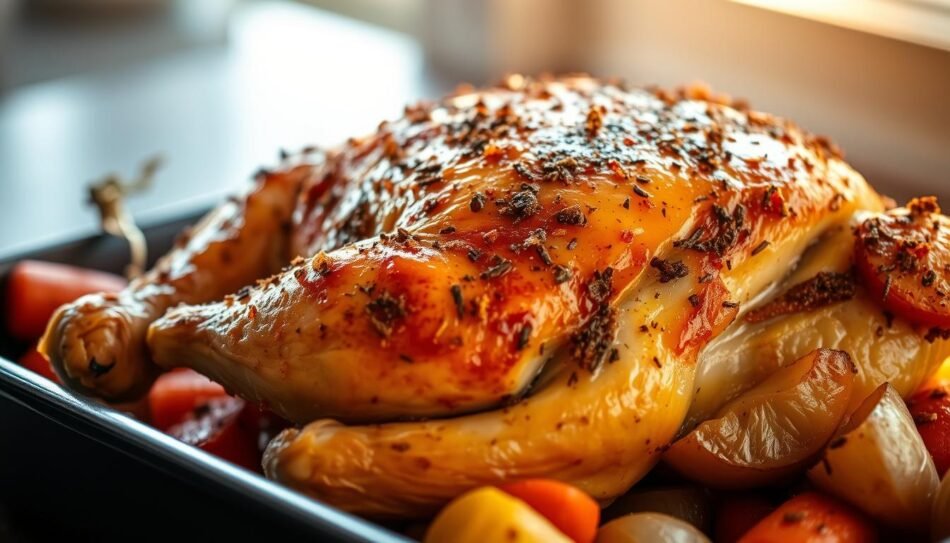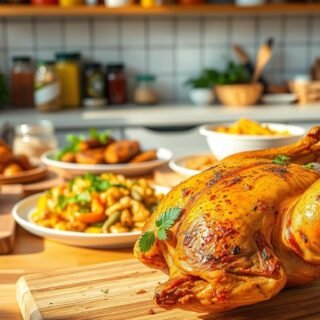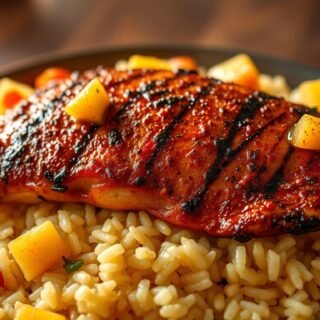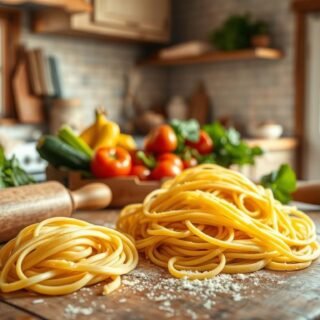Discover three foolproof chicken recipes that guarantee perfect results every time. From crispy roasted to juicy baked chicken, these easy dinner solutions will make you a pro
Every home cook faces the challenge of making a chicken recipe that’s both tasty and easy. I remember my early days in the kitchen, when chicken dinners were a gamble. Sometimes they were dry, sometimes bland, always a surprise.
But what if I told you that making easy chicken meals is easier than you think? Baking chicken doesn’t have to be hard. With the right techniques, you can make chicken breasts taste like they’re from a restaurant.
Imagine having perfectly juicy, flavorful chicken every time. No more worries, no more letdowns. This guide will show you foolproof ways to make your chicken the highlight of dinner.
Key Takeaways
- Discover three reliable methods for baking perfect chicken
- Learn techniques to ensure juicy, flavorful results every time
- Master easy chicken meals with simple, practical tips
- Boost your cooking confidence with proven strategies
- Transform ordinary chicken into extraordinary dishes
Understanding the Basics of Perfect Baked Chicken
Mastering chicken dishes is more than just tossing them in the oven. It’s about knowing the right techniques and tools. These can turn a simple meal into a work of art.
Essential Equipment for Baking Chicken
For perfect poultry recipes, your kitchen needs:
- Oven-safe rack
- Rimmed baking sheet
- Instant-read meat thermometer
- Sharp kitchen knife
- Cutting board
Common Mistakes to Avoid
When cooking chicken, avoid these mistakes:
- Cooking chicken directly on a flat surface
- Not allowing proper air circulation
- Skipping temperature checks
- Overcrowding the baking pan
Temperature Guidelines and Safety
For safe and tasty chicken, temperature is key. The right internal temperature is essential for flavor and health.
| Chicken Type | Safe Internal Temperature | Cooking Time |
|---|---|---|
| Whole Chicken | 165°F | 1-1.5 hours |
| Chicken Breasts | 165°F | 20-30 minutes |
| Chicken Thighs | 175°F | 35-45 minutes |
Pro tip: Always use an instant-read thermometer to check doneness and prevent undercooking or drying out your chicken.
The Science Behind Juicy Chicken Recipe
Making the perfect healthy chicken recipes is more than just following a recipe. It’s about knowing the science behind cooking chicken. When you cook chicken, you’re part of a complex process that makes it either dry or juicy.
Salt is key to tender chicken. When you add salt, it starts a special change in the chicken’s proteins. The salt molecules work with the proteins, making them shrink and create tiny spaces. These spaces let moisture and flavor get deeper into the meat.
- Protein denaturation creates tender meat texture
- Salt helps break down muscle fibers
- Moisture retention depends on cooking technique
Different cooking methods change your chicken recipes in big ways. Baking, roasting, and grilling each affect the chicken’s proteins differently. It’s important to know how heat works with the chicken’s cells. Low, steady heat helps keep moisture in, stopping the proteins from tightening and losing juices.
The secret to juicy chicken lies in respecting its molecular structure during cooking.
Your aim is to turn raw chicken into a juicy, tasty dish by using these scientific tips. By knowing how heat, salt, and cooking methods work together, you can make your chicken dishes truly special.
The Importance of Brining Your Chicken
Brining is a game-changer for baked chicken. It turns ordinary chicken into a juicy, flavorful dish. Whether it’s for a weeknight dinner or a special occasion, brining is key.
Brining helps chicken stay moist while cooking. The salt solution creates a moisture barrier. This makes your chicken tender and tasty. Not all brines are the same, and mastering this can greatly improve your cooking.
How to Create a Basic Brine Solution
Making a perfect brine is simple. Here’s a basic recipe to start with:
- 4 cups cold water
- 1/4 cup kosher salt
- 2 tablespoons sugar
- 3 cloves of smashed garlic
- 10 whole peppercorns
- Peel of half a lemon
Optimal Brining Times
Brining times depend on the chicken cut:
- Chicken breasts: 30 minutes to 2 hours
- Whole chicken: 8-12 hours
- Chicken thighs: 1-4 hours
Different Brining Techniques
Try different brining methods to keep your chicken interesting:
- Wet brining: Soak chicken in a salt solution
- Dry brining: Rub salt on chicken skin
- Flavored brines: Add herbs, spices, or citrus for extra taste
Pro tip: Always refrigerate your chicken while brining to prevent bacterial growth.
With these brining methods, your baked chicken will always be moist, flavorful, and a hit at dinner.
Essential Seasonings and Marinades
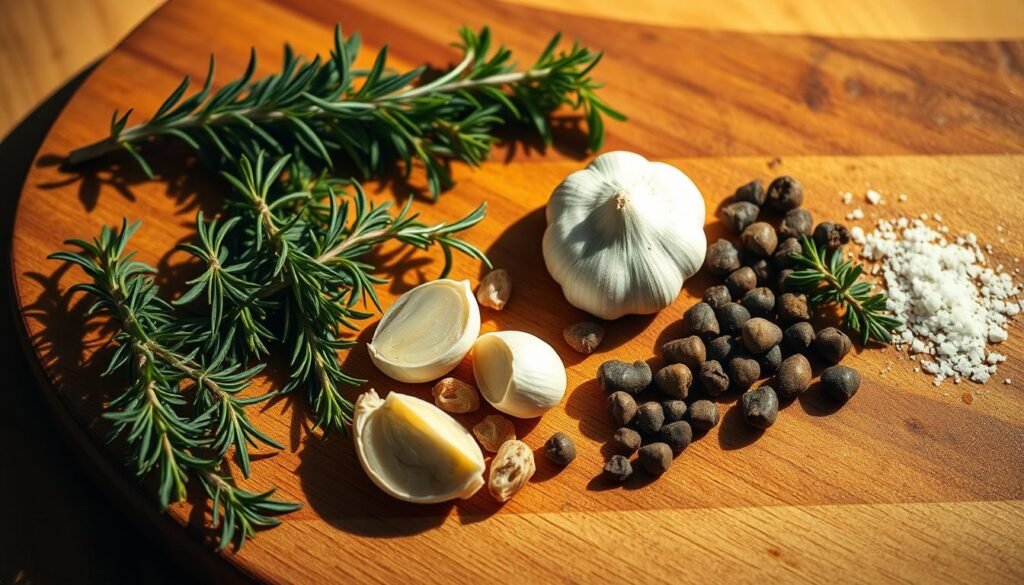
Turning a basic chicken recipe into a masterpiece starts with the right seasonings and marinades. Knowing how to mix flavors can make your chicken dishes go from simple to spectacular.
Marinades are magic for adding taste and tenderness to chicken. The trick is to find the right mix of acid, oil, and seasonings for the best flavor.
- Citrus-based marinades break down protein fibers
- Yogurt helps tenderize chicken while adding creaminess
- Fresh herbs provide vibrant, aromatic notes
When making your chicken recipe, try these classic marinade mixes:
| Flavor Profile | Key Ingredients | Marinating Time |
|---|---|---|
| Mediterranean | Lemon, rosemary, olive oil | 4-8 hours |
| Asian-Inspired | Soy sauce, ginger, garlic | 2-4 hours |
| Spicy Southwest | Lime, chili powder, cumin | 3-6 hours |
Pro tip for your next chicken dish: Always marinate in the fridge. Never use marinades that touched raw chicken to avoid bacteria.
« The secret to an unforgettable chicken recipe is patience and flavor layering. » – Professional Chef
Try different herbs, spices, and bases to find your own chicken marinade. Your taste buds will love it!
Classic Herb-Roasted Chicken Method
Making tasty chicken dishes is easy. Start with a classic herb-roasted chicken method. It turns simple chicken into a dish that wows everyone.
Best Herbs for Chicken
Choosing the right herbs makes a big difference. The top herbs for chicken are:
- Rosemary: Gives a strong, woody taste
- Thyme: Adds a mild, earthy flavor
- Sage: Offers a warm, peppery taste
- Parsley: Brings a fresh, bright flavor
Step-by-Step Preparation Guide
Here’s how to prepare your herb-roasted chicken:
- Pat chicken breasts dry with a paper towel
- Drizzle olive oil over the chicken
- Season with your favorite herbs
- Massage the seasonings into the meat
- Put chicken on a roasting rack
Cooking Times and Temperature
To get the perfect roast, follow these steps:
Bake at 425°F for 18-22 minutes, depending on the chicken’s thickness. Always check with a meat thermometer. It should read 165°F for safety.
Pro tip: Let the chicken rest for 5-10 minutes after cooking. This keeps it juicy.
Butter-Basted Chicken Technique
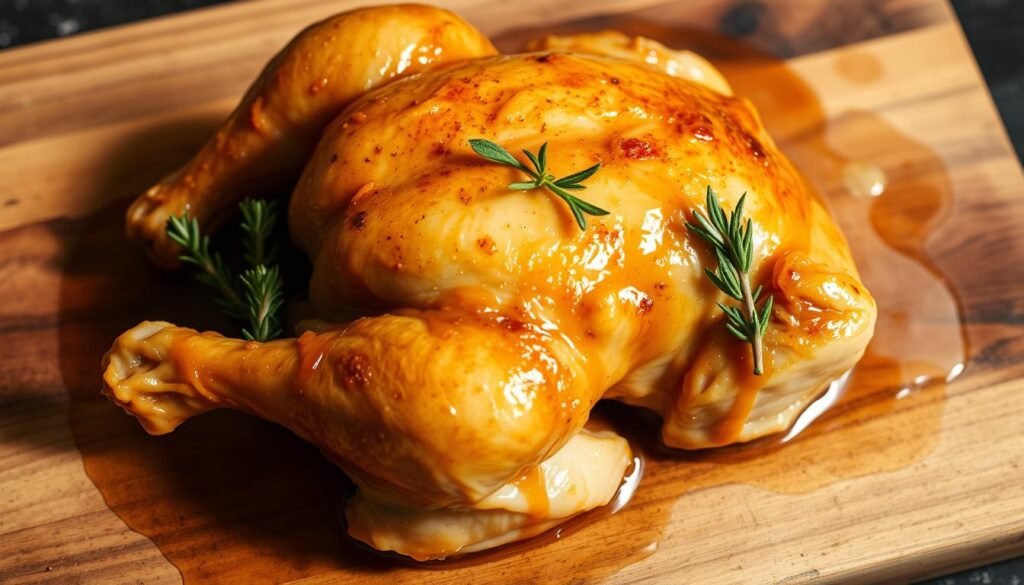
Discover the secret to making chicken incredibly juicy and flavorful with the butter-basting technique. This method turns a simple chicken recipe into a dish that will wow your family and friends.
Butter basting is a trick used by professional chefs to make healthy chicken recipes even better. It involves coating the chicken with melted butter over and over during cooking. This helps:
- Lock in moisture
- Create a golden-brown exterior
- Enhance natural flavors
- Prevent the chicken from drying out
To master this technique, you’ll need a few key tools:
- A heavy-bottomed skillet
- High-quality butter
- A basting brush
- An instant-read meat thermometer
Pro tip: Choose unsalted butter for better control of the seasoning in your chicken recipe. Start by melting butter in a hot skillet. Then, gently baste the chicken every 3-4 minutes. This method ensures even heat distribution, creating a crispy exterior and a tender inside.
« Butter basting is like giving your chicken a flavor massage, » says professional chef Michael Rodriguez.
Try using herb-infused butter or adding white wine to your basting liquid for more flavor. The key is to be patient and keep basting to get that perfect golden-brown finish.
Parchment Paper Method for Moist Chicken
Discover a game-changing technique for creating delicious baked chicken. This method ensures maximum moisture and minimal cleanup. It transforms your easy chicken meals into a culinary experience that will impress your family and friends.
Parchment paper isn’t just for baking cookies. It’s a secret weapon for preparing perfectly moist chicken. This method locks in flavor and nutrients, making your chicken tender and succulent with minimal added fat.
Benefits of Parchment Paper Cooking
- Locks in natural moisture
- Prevents chicken from drying out
- Reduces need for additional oils
- Ensures even cooking
- Simplifies cleanup process
Proper Wrapping Techniques
Mastering the parchment paper wrapping technique is crucial for achieving perfect baked chicken. Start by cutting a piece of parchment paper large enough to fully enclose your chicken breast or pieces.
| Wrapping Step | Key Detail |
|---|---|
| 1. Positioning | Center chicken on parchment paper |
| 2. Folding | Create tight, overlapping seals |
| 3. Sealing | Crimp edges to prevent steam escape |
| 4. Baking | 30-35 minutes at 375°F |
When done correctly, your parchment paper packet will create a steamy environment. This keeps your baked chicken incredibly juicy. Pro tip: Feel free to add herbs, lemon slices, or vegetables inside the packet for extra flavor infusion.
Whether you’re preparing a quick weeknight dinner or meal prepping for the week, the parchment paper method guarantees delicious, moist baked chicken every single time.
Storage and Meal Prep Tips
Learning how to store and prepare chicken can change your kitchen routine. The right storage keeps your chicken fresh, safe, and tasty for many meals.
Refrigeration Strategies
Put your cooked chicken in airtight containers to keep it fresh. Quick tip: Cool your chicken down completely before putting it in the fridge to stop bacteria from growing.
- Store boneless, skinless chicken in the fridge for up to 3-4 days
- Use shallow containers to help chicken cool faster
- Keep refrigerated chicken at or below 40°F
Freezing Techniques for Poultry Recipes
Freezing is a great way to keep your chicken dishes fresh longer and make meal prep easier.
| Chicken Type | Refrigerator Storage | Freezer Storage |
|---|---|---|
| Cooked Chicken Breasts | 3-4 days | 2-6 months |
| Whole Cooked Chicken | 3-4 days | 4-6 months |
Reheating Tips
Always heat your chicken to 165°F when reheating to keep it safe. Use oven warming or microwave heating with a damp paper towel to avoid drying out.
- Preheat oven to 350°F
- Add a splash of chicken broth to keep it moist
- Cover with foil to stop it from drying out too much
- Heat until the inside reaches 165°F
By using these storage and meal prep tips, you’ll get the most out of your chicken recipes. You’ll also keep your food safe and flavorful.
Creative Ways to Use Leftover Baked Chicken
Got leftover baked chicken? Don’t let it go to waste! It can turn into exciting meals that will make you happy.
Chicken salads are a quick and healthy lunch option. Shred the chicken and mix it with greens, veggies, and a zesty dressing. These salads are perfect for busy days.
- Mediterranean Chicken Salad with olives and feta
- Southwest-style Chicken Salad with corn and black beans
- Classic Chicken Caesar Salad
For a warm, comforting meal, try chicken casseroles. Leftover chicken is great for casseroles that are full of flavor and feed many.
- Cheesy Chicken and Rice Casserole
- Creamy Chicken Broccoli Casserole
- Spicy Chicken Enchilada Casserole
Pro tip: Chop leftover chicken into small pieces for easy mixing into new dishes. Whether it’s salads or casseroles, your leftover chicken is ready for your creativity.
Transform yesterday’s meal into today’s delicious adventure!
Troubleshooting Common Baking Issues
Getting your chicken recipe just right can be tough, especially when things don’t go as planned. But, baking chicken doesn’t have to be a gamble. With the right methods, you can make delicious, juicy chicken every time.
Dry chicken is a big problem for many home cooks. It usually happens because the chicken is overcooked or the temperature is off.
Preventing Dry Chicken Disasters
- Use a meat thermometer to check internal temperature
- Remove chicken from oven when it reaches 160°F
- Let meat rest for 5-10 minutes after cooking
- Consider brining chicken before baking
Temperature Control Tips
Getting the temperature right is key for a great chicken recipe. Different chicken pieces need different cooking methods to stay moist and flavorful.
- Boneless breasts: Bake at 375°F for 20-25 minutes
- Bone-in thighs: Roast at 425°F for 35-40 minutes
- Whole chicken: Roast at 425°F, approximately 15 minutes per pound
Remember, patience is key when baking chicken. Hurrying can make the meat dry and tough. By following these tips, you’ll make chicken that’s as good as what you get in a restaurant.
Conclusion
Baking chicken doesn’t have to scare you. You now know how to make simple chicken into tasty dishes. These dishes will wow your family and friends. Whether it’s for appetizers or a main course, you’re set to cook perfect chicken every time.
You’ve grown your kitchen skills a lot. You know how to use herbs, butter, and parchment paper to make chicken special. Grilled chicken can also get a boost from these skills, making your cooking even more versatile.
Keep practicing to get better at cooking. Try new seasonings, brining, and cooking times. Each try will make you more confident and skilled. Great cooking is about passion, creativity, and learning from every kitchen experience.
We want to hear about your chicken cooking adventures. Share your stories on social media, exchange recipes, and keep exploring new ways to cook chicken. Your journey to becoming a chicken-cooking pro begins today!

